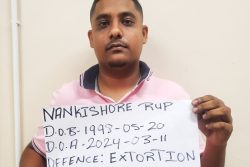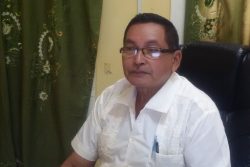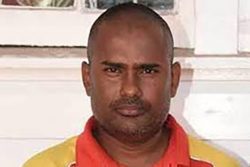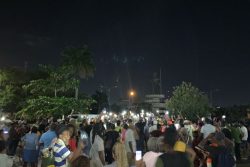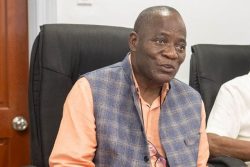Dear Editor,
Finally, Vice President Mr. Bharrat Jagdeo and Leader of the Opposition Mr. Aubrey Norton are ad idem on something: according to Demerara Waves, a usually reliable source, when referring to the influx of Venezuelan nationals that have crossed the border into the county of Essequibo, the VP, ‘like the Opposition Leader…said those with no ties here must be treated as “refugees” rather than migrants’. For his part, Mr. Norton is quoted in the Kaieteur News as referring to ‘the influx and uncontrolled integration of refugees’ from Venezuela. Unfortunately, because of their similar positions, these two gentlemen will find themselves at odds over Guyana’s treaty obligations and its need to adhere to international law. The 1951 Convention Relating to the Status of Refugees, to which Guyana is a Party, provides a regime for the protection of persons who are fleeing a country because of a well-founded fear of political or other forms of persecution. They are protected by the French principle of non-refoulement, by which a refugee cannot be returned (“refouler”) to a country where their life or freedom would be threatened.
It remains the case that the vast majority of Venezuelans entering Guyana via the “back track” route are economic migrants, who are not fleeing persecution, but rather trying to escape the harsh economic conditions that have befallen our oil-rich neighbour to the West, and seeking to make a better life for them and their families. Make no mistake: these people are not refugees and are not entitled to any of the protections granted by the 1951 Refugee Convention. Neither are they covered by the 1990 Convention on Protection of Migrant Workers, as they fall outside of the categories of “migrant worker” or “frontier worker”: they come to Guyana looking for employment, rather than to take up employment. Should they return to their homeland, no prosecution nor jail cell awaits them. As reported by DemWaves, Mr. Jagdeo quite rightly stated that those Venezuelans with no ties here would be required to leave Guyana. I venture to go further: ties or no ties, in so far as they do not fit the legal criteria of a refugee, their days here are numbered, and their rights limited, what with crippling economic sanctions against Caracas being lifted and national elections on the horizon.
It is almost as if Guyana has been dealt a poor hand, a “double-whammy”, by dint of geography, first by having to contend over decades with the spurious territorial claim and now faced with an exodus of desperate persons arriving from a neighbouring state. In this regard we were not alone, and daily images on international television a few years ago of Venezuelans feeling into neighbouring Colombia, portended the balloon effect that led to our current challenges in the Essequibo. Whereas the practice for decades has been to return those who do not qualify for refugee status to their country of nationality or, in certain cases, the country from which they arrived, Guyana does not have available the option that has evolved in recent years, of paying a third country to “hold” or return prospective arrivals – witness the policy of Italy, supported by the EU, as regards such facilities located across the Mediterranean Sea in Libya. In any event our relatively low population density would be a factor with which to be reckoned. We recently saw a novel application of this approach to unwelcome arrivals when one of the great colonisers, the United Kingdom, entered into an arrangement with Rwanda, a country 4000 miles away in Central Africa, to provide an alternative destination for those arrivals.
An earlier UK High Court ruling that declared the arrangement to be lawful was overturned last June by the Court of Appeal; their Supreme Court is currently seized of the matter. I wonder what Professor Dame Roslyn Higgins, former Member and President of the ICJ, and my supervisor for the LL.M. at the London School of Economics, would have to say about this? But, while bereft of any such option, this does not prevent Guyana from taking the moral high ground and exercising a temporary, discretionary and humanitarian approach to these hapless citizens of the world, in the spirit of good-neighbourly relations. It is for similar reasons that in times of conflict, a warship is under an obligation to rescue sailors from an enemy vessel in distress, or for combatants to treat POWs with dignity. For Mr. Norton’s part, he descends into a quagmire of speculation and uncertainty by referring to a “soft invasion” of our dear land of Guyana, replete with the placement of Spanish-speaking migrants in ‘key government, military and leadership positions’ (!!), and drawing a fanciful similarity between what occurred with the annexation by Russia of the Crimea in 2014, and what is currently taking place in the Essequibo!
Such an unpatriotic point of view overlooks the long and deep historical, societal and cultural ties between the ‘ethnic Russians and Russian speakers’ situate in the Crimea, when comparing the more recent occurrence of Venezuelans “squatting” in the Essequibo. It does not take account of the political turmoil in Kyiv at the time that created the objective conditions for a Russian “land-grab”. It glosses over the fundamental point that from around 1920 until as recently as 1991, Ukraine formed part of the USSR. Was the Essequibo during that same period ever recognized internationally as a constituent part of Venezuela, or at any time during Guyana’s 57 years of independence, for that matter? Is the legal and territorial status of the Crimea soon to be pronounced upon definitively by the ICJ, as is the case with our “not-a-blade-of-grass” Western interior, which for over a century has always been represented on internationally recognized maps as part of one unitary state, Guyana? Where is the analogy, the precedent!? Cheese and chalk, mango and pear!! But alas, the LOO is not alone.
Mr. Hamilton Green has also added his two cents to the discourse, regrettably, it would seem, from a position of even more confusion, by lumping together ‘refugees and persons seeking a better life’ (economic migrants?), and urging Guyanese to welcome both groups openly, apparently without distinction nor due regard for our international treaty obligations. Mr. Green also groups together ‘refugees, migrants and interlopers’ – international law does not recognize the latter category – and makes a similar quantum leap as Mr. Norton by comparing ‘in another continent, the realignment of borders….’. All I can say to this gentleman is that the annexation of territory, particularly in the current hemispheric environment – is made up of much sterner stuff than the simple calculus of a majority in numbers. Both Messrs. Norton and Green may well have been taken to this place of fantasy by Commodore (Ret’d) Gary Best, who I believe had first raised this sensational spectre of what I term “annexation by analogy”.
Although he is a sitting member of their party’s Central Executive Committee, neither of them saw it fitting to credit him, either by name or conceptually, with the dismal prospect of us losing the Essequibo to our neighbour to the West. I was particularly intrigued by this point of view, coming as it did from a former Chief of Staff, lawyer, and now distinguished international relations scholar. Suffice to say that as regards any manifestation of the policy of “creeping frontiers” that may be part of a grand Venezuelan design on our homeland, I choose to place my money, and my abiding faith, in the intervening circumstance of the ruling of the ICJ – the principal judicial organ of the UN – and Article 94 of the Charter which, inter alia, mandates compliance with decisions of the ICJ. Going forward, what are the options available to our policy makers? Mr. Chabrol reports that Guyana’s security personnel are screening people arriving here, and quotes Mr. Jagdeo as saying that they are carrying out ‘a lot of background checks’ and interviews. While this is no doubt commendable, more can be done.
It will be recalled that shortly after the PPP got into government in 1992, a small number of Angolans arrived here and applied for refugee status. At that time, as Legal Adviser to the Foreign Minister, I worked closely with then Attorney General Mr. Bernard De Santos, S.C., and then Minister of Home Affairs Mr. Feroze Mohamed – both of blessed memory – to craft Guyana’s response to this challenge. Is so doing the government turned to the regional office of the UN High Commissioner for Refugees, for specialist advice in interrogation and investigative techniques, among other things, which eventually resulted in the Angolans being granted refugee status. This should once again be done and both the UNHCR and indeed the International Organisation for Migration, now have local representation. Security, after all, could be our primary but not exclusive concern. Secondly, our hemispheric neighbour to the North – the locus of the proverbial “American dream”, the destination which frequently continues to provide the pull factors for economic migrants worldwide, should be prevailed upon to provide resources, be it technical, material or financial, to address the problem.
We have indeed now come full circle: in the spring of 1994, when the Haitian refugee crisis had started to overwhelm the authorities in Florida, I was at the time responsible for the day to day running of the Guyana Mission to the UN, while our Permanent Representative kept the flag flying as the first President of the UNGA from the English-speaking Caribbean. The then US Ambassador to the UN, Madam Madeleine Albright, requested a meeting with CARICOM to solicit our assistance – yes, our assistance – to help absorb the steady influx of Haitians arriving on the shores of the Southern United States. I was less phased by the thought of this diplomatic titan sitting down in person to meet with us than I was by the gravamen of the request. Like a dutiful public servant, I sought instructions from Capital, and was told in no uncertain terms by then Director General Ambassador Cheryl Miles that the matter was way above my pay grade and that the US should be advised to bring the request to the attention of the meeting of the CARICOM Foreign Ministers that had simultaneously convened in Belize.
Armed with my instructions, I canvassed that view at a pre-meeting of CARICOM Ambassadors the next morning and Guyana’s position carried the consensus. It was then put to Madam Albright by Grenada, the Chairman of the CARICOM Caucus of Ambassadors in New York; I reminded her that she had time on her side, as Belize was now waking up as we were meeting. Ms. Albright quickly scribbled a note to one of her aides as I was speaking, which instructed that contact be immediately made with the US Embassy in Belize. I submit that it is time we return the favour to our friends up North, not in substance, but rather adjusted to take account of the current geo-political realities. Finally, Guyana should up the ante in its PR campaign to rebut some of the negativity being spewed from Caracas – this is a battle that successive governments here have been losing. Based on my own soundings, Venezuelans currently residing in Georgetown do not have a favourable view of life in the place they know as home under President Maduro – it is for this reason after all, that they are here in the first place.
Proceeding on the premise that this is also the case with those who are currently enjoying our humanitarian hospitality in the North West, this is a treasure trove of opinion waiting to be mined and exploited to our benefit, especially when there is talk of a referendum being held among them. Let us be clear: as a small peace-loving and resource-strapped nation, diplomacy continues to be our first line of defence. We continue to rely on our friends and partners in the international community which share our commitment to international law and advocate for the peaceful settlement of disputes. Guyana’s tenure on the Security Council, in process for years, could not have come at a more opportune time. And yes, your Sunday editorial is right;
Sincerely,
Neville Bissember



